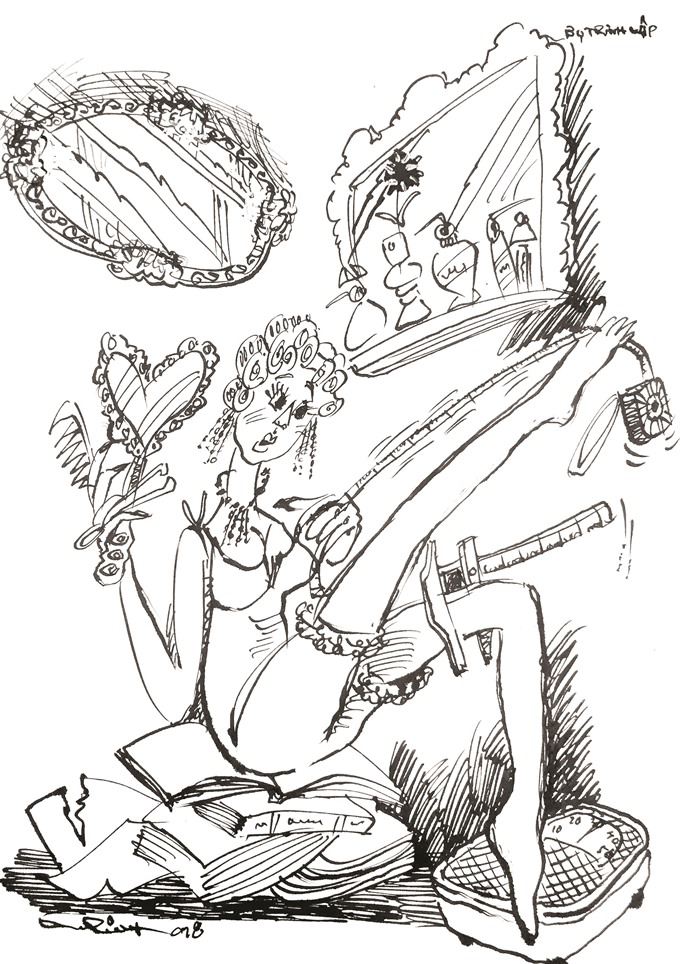 Talk Around Town
Talk Around Town

In today’s age of youthfulness and good looks, it is such a strong peer pressure for teeage girls and boys to put out their best looks, best clothing or accessories. Teenage has become a very volatile time of growing up, where one can swing both way: becoming confident and getting through puberty successfully, or becoming intimidated and shy away, and bear in their heart the deep scars of self-confidence.
 |
| Illustration by Trịnh Lập |
By Nguyễn Mỹ Hà
In today’s age of youthfulness and good looks, there is strong peer pressure for teenage girls and boys to wear their best clothing and accessories. Teenagers can become very volatile as they grow up, becoming confident and getting through puberty successfully, or becoming intimidated and withdrawn.
Sitting in the audience of my daughter’s school debate last week, I noticed that some of the students took the subject seriously and delved deep into the matter. Among the subjects were body shaming, private vs public schooling, the healing power of classical music and positive thinking.
My 9th grader chose to talk about beauty standards vs teen insecurities.
So she started out by asking everyone in the audience: “If any of you here ever been called ugly, please raise your hand?” She also raised her left hand.
An English teacher sitting next to me mumbled: “Oh, everyday!”
“People may call you ugly, but do they know what beauty really is?”
“What exactly is beauty?” she asked, then quoted the Oxford Dictionary’s definition by saying: “Beauty stands for quality or state of being beautiful, very pretty or attractive.”
She went on to say that beauty standards have been different through the centuries and among different races, cultures and peoples.
She pointed out that during the Renaissance when curvy women were the epitome of beauty, petite skinny girls and tiny waists became the norm centuries later.
“Asians are obsessed with fragile, pale skin and spare no efforts to use products with the word ’whitening’ on them, even if it damages their skin, bleaches it and makes it unhealthy and fragile," she said.
“On the other hand, westerners are dying to have tanned skin, and they spent loads of money on spray tan and sun beds which also damage their skin.”
So it is impossible to meet all these beauty standards at the same time which vary so much from East to West at different times.
So why would she care so much about this subject? She asked and found her own answer.
Here classmates ask her everyday: “Do I look pretty? Am I not cute enough?" Then she checks herself out in a mirror every once in a while to a point that it becomes annoying for my daughter.
“I think she’s beautiful but she’s too insecure!”
“There are girls out there who think they are not pale enough, not skinny enough, not cute enough, but little do they know that the dark skin tone they’ve always been so conscious about is what so many girls out there want so badly.”
Being tanned is beautiful, but it just doesn’t fit with Vietnamese “Snow White” standards.
She went on to describe a shocking experience a Vietnamese teenage girl who was born and lives in Germany went through while visiting Hà Nội last month.
“She was shocked when her own relatives told her that her naturally tanned skin looked ’dirty’, whereas back in Germany, her natural complexion has always been called beautiful. She was in complete shock.”
“People can be so rude,” the girl from Germany was quoted as saying. “They say it straight to your face!”
People who think it’s alright to say “you are ugly” to someone else do not care about that person’s feelings.
“I’d like to say this to all my ladies out there,"she said. “Girls, you are amazing just the way you are!
“Tanned or pale, curvy or skinny, cute or edgy, there’s always someone who sees you as their Goddess of beauty! Don’t waste your time or money living up to their approval. ‘Forget the haters, cause there’s always someone who loves ya,’” quoting Miley Cyrus.
“Body-shaming others won’t make you anything close to ‘decent’ looking, it just shows that you have closed eyes, closed minds, and a closed personality.
To the confused, insecure girls, she said: “Your confidence, intelligence and kindness enhance what’s on the outside. And when you’re confident, intelligent and kind, with a little bit of talent, no beauty standards can call you ugly. Confidence, by the way, means doing things because you like it that way, and I like it this way!”
She finished her speech by dropping the microphone on the stage (a trick suggested by her fellow competitor, who shared the same coach) and started dancing for a minute or so.
After the entry, I posted the clip on Facebook, my FB friends mostly commented on my daughter’s voice and dancing. Some liked her British accent and her emotion-charged speech. But above all, those who found a common feeling with what my daughter had to say were very honest.
“She’s such a brave girl, she spoke out for many of us. After many years living abroad, I fear going back to Việt Nam to hear such comments!”
Another friend wrote: “For a young girl living in Việt Nam, I find it quite impressive, because our children living abroad may not have the guts to write such an eloquent speech. People are more interested in their looks.”
“What a rhetoric,” read another comment.
The mother of the girl from Germany was so moved by the speech, she wrote: “My daughter was really touched to listen to the clip. She sends her respects because your daughter spoke for what she thought, and many more.”
And the mother wrote that she had become more tolerant with her daughter, and in retrospect, she had found peace with her self back when she was also a teenage girl. — VNS